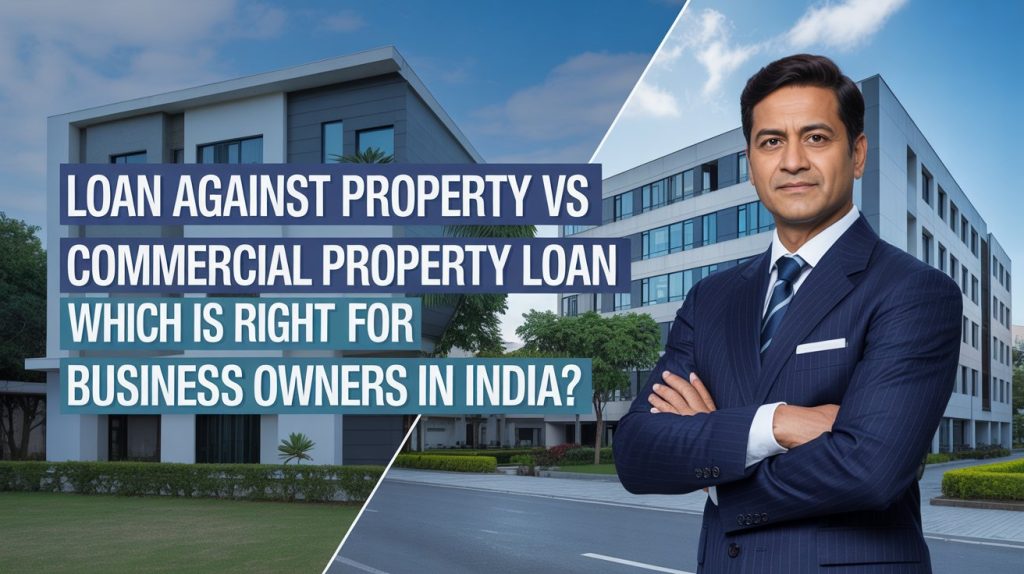Introduction on Loan Against Property vs Commercial Property Loan
Starting a business or meeting large expenses requires access to funds quickly. Two popular financing solutions in India are the Business Loan and the Loan Against Property (LAP), both providing access to funds but varying significantly in terms of their interest rates, tenure length, eligibility criteria and usage flexibility.
Business loans tend to be unsecured loans – meaning you do not need collateral as security – meaning interest rates could be higher and loan amounts largely depend upon both your credit score and financial history.
Loan Against Property (LAP) loans are secured loans where your residential or commercial property serves as collateral, typically provided by banks or non-bank financial companies (NBFCs). They typically offer larger loan amounts with lower interest rates and longer repayment terms as they consider this form of funding more secure than loans secured against property alone.
When financing property purchases/leasing purposes using this method of funding, they typically offer larger loan amounts with reduced rates of interest and longer tenure terms than loans secured against property alone.
Here lies the rub – can LAP lenders deliver what banks/NBFCs promise? The question remains unanswered.
Which loan option is right for me: Loan Against Property (LAP) or Business Loan? Should I mortgage my residential property to fund commercial real estate purchases, or is commercial real estate better?
Additionally, what are the key differences among LAP, home loans and mortgage loans in India?
This guide seeks to clarify the distinctions among Business Loans, Loan Against Property (both residential and commercial), and Home Loans so that you may find an ideal financing solution for yourself and your needs.
What Is a Business Loan?
A Business Loan is one of the most prevalent financing solutions for entrepreneurs, SMEs, and self-employed professionals alike. Unsecured loans tend to carry greater risks due to not offering property as collateral – meaning lenders may bear more of it and interest rates may be higher than secured loans like LAP.
Collateral: Not required (unsecured).
Loan Amount: Loan amounts typically range between Rs1 Lakh to Rs50 Lakhs depending on creditworthiness.
Interest Rate: Interest rates typically range between 10%–24% annually depending on the bank/NBFC and applicant profile.
Repayment Tenure: Shorter – usually 1–7 years.\
Processing Time: Approvals can be completed more rapidly due to reduced documentation requirements.
Credit Score Eligibility Criteria
When comparing Loan Against Property vs Commercial Property Loan, lenders usually evaluate similar eligibility factors. The key requirements include:
CIBIL Score: An outstanding credit score of 650+ is recommended to improve approval chances.
Business Age: Most lenders prefer businesses with at least 2–3 years of successful operations before seeking expansion loans.
Income Stability: Reliable cash flow and profitable ITRs are essential for loan approval.
Documents Required: PAN card, Aadhaar, business registration certificate, audited financial statements, GST returns, and ITR filings.
Documents Required: PAN card, Aadhaar number, business registration certificate, financial statements, GST returns, ITR returns etc.
Meeting these eligibility criteria improves your chances of getting the best deal between a Loan Against Property and a Commercial Property Loan in India.
Pros of a Business Loan
- Easy disbursal with minimal paperwork and collateral requirements.
- Suitable for short-term working capital needs.
However: Higher interest rates, smaller loan amounts than LAP, shorter repayment tenures = increased monthly repayment obligations.
What Is a Loan Against Property (LAP)?

A Loan Against Property is a type of secured loan in which your residential, commercial, or industrial property serves as collateral against borrowing money from banks, non-bank financial companies (NBFCs), or housing finance companies.
By having such collateral protection, Loans Against Property often provide:
- Larger loan amounts.
- Lower interest rates.
Longer tenure than conventional business loans.
Key Features of LAP
- Collateral: Residential, commercial, or industrial property.
- Loan Amount: Rs10 Lakhs to Rs10 Crores depending on property value.
- LTV Ratio (Loan-to-Value): 50–75% of market value of property.
- Interest Rate: 8%–12% per annum.
- Repayment Tenure: 15–17 years, making EMIs more manageable.
Usage: Funds may be used for business, education, medical expenses, marriage, or debt consolidation.
Eligibility Criteria
- Salaried Applicants: Proof of employment and income, excellent credit history.
- Self-Employed/Business Owners: ITR returns, balance sheets, GST returns for business stability.
Property Requirements: Clear title ownership + proper valuation documents.
Pros of LAP
- Lower interest rates due to collateral.
- Larger loan amounts compared to business loans.
Longer repayment tenure = smaller EMIs.
Cons of LAP
- Property collateral required.
- Processing times (valuation, legal checks).
Risk: Property may be seized in case of default.
Quick Comparison (Business Loan vs LAP)
- Business Loan: No collateral, 10%–24% interest, 1–7 years tenure, fast processing.
LAP: Requires collateral, 8%–12% interest, 15–17 years tenure, slower processing, property at risk.
Loan Against Residential or Commercial Property

One of the main considerations when taking out a Loan Against Property (LAP) loan is: should I mortgage my residential or commercial property?
Both are acceptable, but each has different eligibility, valuation, risks and benefits.
1. Loan Against Residential Property
- LTV Ratio: 65%–75%.
- Interest Rate: Slightly lower than commercial LAP loans.
- Usage: Business, education, medical, marriage, or debt consolidation.
Eligibility: Salaried + self-employed with clear title documents.
Pros:
- Higher loan-to-value ratio.
- Easier approval process.
- Slightly reduced interest rates.
Cons:
- Risk of losing your home if default occurs.
- Not available for ancestral/undivided properties.
Best for: Borrowers seeking larger loans at reduced rates who are comfortable using their home as collateral.
2. Loan Against Commercial Property
- LTV Ratio: 50%–66%.
- Interest Rate: Slightly higher than residential LAP.
- Usage: Business expansion, working capital, machinery, new units.
- Eligibility: Business owners/self-employed professionals.
Pros:
- Only commercial property mortgaged – residence remains safe.
- High-value loans possible in premium locations.
Cons:
- Lower loan-to-value.
- Higher rates than residential LAP.
Ideal for: Entrepreneurs seeking funds for expansion without risking their home.
Conclusion
Both Loan Against Property vs Commercial Property Loan serve different purposes. While a business loan offers speed and convenience, LAP offers affordability and higher loan amounts.
At Akme Fintrade (India) Limited, we provide:
- Quick processing for both Business Loans & LAP.
- Flexible repayment tenures.
- Competitive interest rates.
- Special schemes for women entrepreneurs and rural business owners.
Whether you’re expanding your business, managing working capital, or looking for a secured loan solution, Akme is your trusted financial partner with 29+ years of experience.
Contact Akme Fintrade today to explore the best loan options for your needs.






